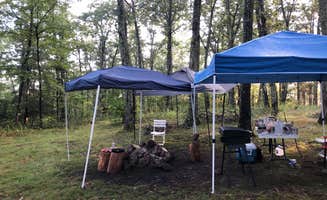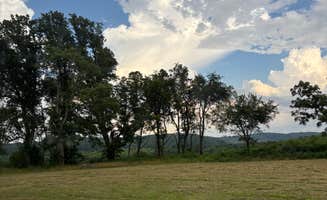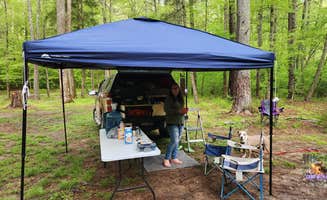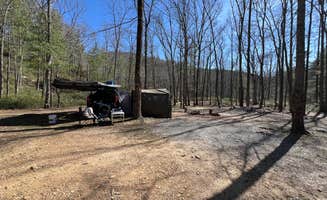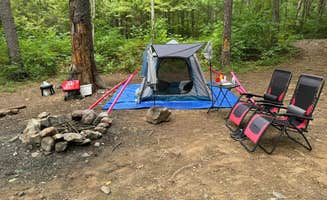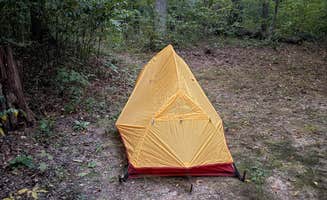Primitive camping near Roseland, Virginia offers secluded backcountry experiences throughout George Washington National Forest's diverse terrain, with elevations ranging from 1,600 to 3,000 feet. The forest's watershed feeds numerous small creeks ideal for water filtration, though terrain can be challenging after rainfall. Most dispersed sites remain accessible from April through November, with temperatures averaging 45-75°F during prime camping seasons.
What to do
Hiking to summits: Several trails near Spy Rock provide exceptional hiking opportunities. "The hike up is brutal but the top is absolutely worth it," notes Emily T., who adds "It's literally just the top of a mountain, nothing but what you carry up with you." Another route leads to the Appalachian Trail from forest roads, providing day-hike options from your campsite.
Fishing for trout: The stocked pond at Braley Pond Dispersed Camping & Day Use Area offers productive fishing during designated seasons. "The pond is stocked with trout in season, check DGIF site for dates," advises Paul P. The site provides both pond and stream fishing options within walking distance of campsites.
Creek exploration: Many dispersed sites feature small stream access for wading and water collection. At Braley Pond, one camper shared "Though you can't swim in the lake, we did wade the stream, which was cold and clear and beautiful." These waterways provide natural cooling during summer months while requiring minimal hiking from campsites.
What campers like
Privacy despite proximity: The George Washington National Forest off 812 offers multiple sites that balance accessibility with seclusion. "Showed up around 5pm and were the only ones there. 6-8 different sites, all are beautiful and most are right next to the creek," reports Sawyer B. Sites typically feature adequate separation while remaining within reasonable distance of forest roads.
Stone fire rings: Most dispersed sites include established stone fire rings constructed by previous campers. "There was a fire ring and man made stone oven at the site we chose," notes one visitor to Forest Road 812. These ready-made fire containment areas reduce impact while providing cooking and heating options.
Star visibility: The distance from urban areas creates exceptional night sky viewing opportunities. Austin K. observed at Braley Pond: "The stars were amazing! There was plenty of wood scattered about to use as firewood." Minimal light pollution and open clearings at many sites contribute to astronomical viewing conditions rarely found in more developed areas.
What you should know
Vehicle requirements: Access to many sites requires appropriate vehicles, especially after weather events. "It is a very rocky path, about 50 feet long, to get into the campground, but then it is smooth and well laid out," explains Jon N. about a Dispersed Camping Site off FR 812.
Weather impacts: The terrain's low-lying areas can become problematic during heavy rain. One camper at Braley Pond noted, "This area is fairly low, and the road and sites can easily be soaked, if not underwater after really heavy rains." Planning alternate sites during wet seasons is advisable.
Wildlife Management requirements: For camping at James River Wildlife Management Area, specific permits must be purchased in advance. "You simply need to purchase either a daily or annual access pass from the DWR website and then report which days you will be staying at the WMA—it's currently $23 for the annual pass," explains Zach K.
Tips for camping with families
Beginner-friendly sites: For families new to primitive camping, certain areas provide easier access while maintaining the backcountry experience. Amy S. found Braley Pond "perfect for our first dispersed campsite experience. The day use area is close enough to use the bathroom (just an open pit toilet, nothing fancy)."
Teaching opportunities: The accessible streams provide natural learning environments for children. "We took advantage of the trails in the morning. It was pretty muddy even though it was in the low 30s so wear applicable footwear," advises Austin K., highlighting educational hiking opportunities regardless of season.
Space considerations: Reservoir Road Dispersed Campsite offers larger clearings suitable for family setups. "Nice camping spots on the pedlar river in Amherst county. Multiple spots along reservoir rd," notes Derek D., though accessing these sites requires navigating approximately 5 miles of dirt road.
Tips from RVers
Site selection for larger vehicles: The James River Wildlife Management Area accommodates various vehicle sizes in specific areas. One RVer with a 29-foot Class C motorhome reported: "I opted to park it in a field/parking area at the entrance. I was the only one here all day."
Road navigation challenges: RV owners should research access routes thoroughly before attempting forest roads. "Went in August and it was very buggy, also had someone park pretty close which when I drive down a really long dirt road that is questionable for my van, i want it to be private," notes SJ W. about Reservoir Road, emphasizing the need for privacy expectations and vehicle clearance planning.
Resource limitations: All primitive sites around Roseland require complete self-sufficiency. Dave P. reports from Braley Pond: "There is no cell signal here (at least with Verizon as of 3/2020)," highlighting the need for advance planning and offline navigation capability when bringing larger vehicles into these areas.


